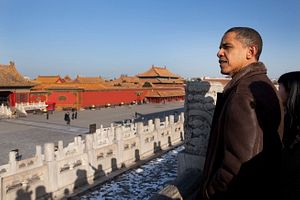In an unusually candid set of remarks delivered on Wednesday, U.S. President Barack Obama expressed concern that Chinese President Xi Jinping’s fast and comprehensive consolidation of power could lead to human rights violations and increased nationalism in China. Speaking to a roundtable of top U.S. chief executives and business leaders in Washington D.C., Obama said that Xi has “has consolidated power faster and more comprehensively than probably anybody since Deng Xiaoping.” While it has become almost cliche at this point to compare Xi’s consolidation of power to that of Deng Xiaoping, Obama had refrained from making the comparison before. Obama added that “everybody’s been impressed by [Xi’s] … clout inside of China after only a year and a half or two years.”
Obama, who most recently met Xi last month on the sidelines of the APEC Summit in Beijing, warned that Xi’s rise and power consolidation could lead to negative outcomes. “There are dangers in that. On issues of human rights, on issues of clamping down on dissent. He taps into a nationalism that worries his neighbors,” Obama said. Between the reference to Deng Xiaoping and concerns that China may clamp down on dissent, Obama’s language hearkens to the Tiananmen Square massacre of June, 1989 — something many analysts feared when Hong Kong’s current protests began. Similarly, Obama’s concerns about Chinese nationalism have to do with maritime disputes in the Asia-Pacific. China claims almost the entirety of the South China Sea and is engaged in territorial disputes with Vietnam, the Philippines, Brunei, and Taiwan in that region. Additionally, China and Japan are engaged in a territorial dispute over the Senkaku/Diaoyu Islands in the East China Sea.
Obama punctuated his remarks by stating his confidence in the continued success of U.S.-China bilateral relations. “On the other hand, I think they have a very strong interest in maintaining good relations with the United States. And my visit was a demonstration of their interest in managing this relationship effectively,” he said. He added that he wants to show China that the United States wants to create “win-win” outcomes in bilateral diplomacy while continuing to address areas where the two countries have their differences like human rights, cyber theft, and China’s role in Asia’s maritime territorial disputes. On cyber theft in particular, Obama told the business leaders that it was “indisputable” that China engages in the practice, and that the United States “[pushes] them hard on it.” Obama’s remarks echo similar comments made by his Secretary of State, John Kerry, ahead of the APEC Ministerial Meeting in November 2014.
































